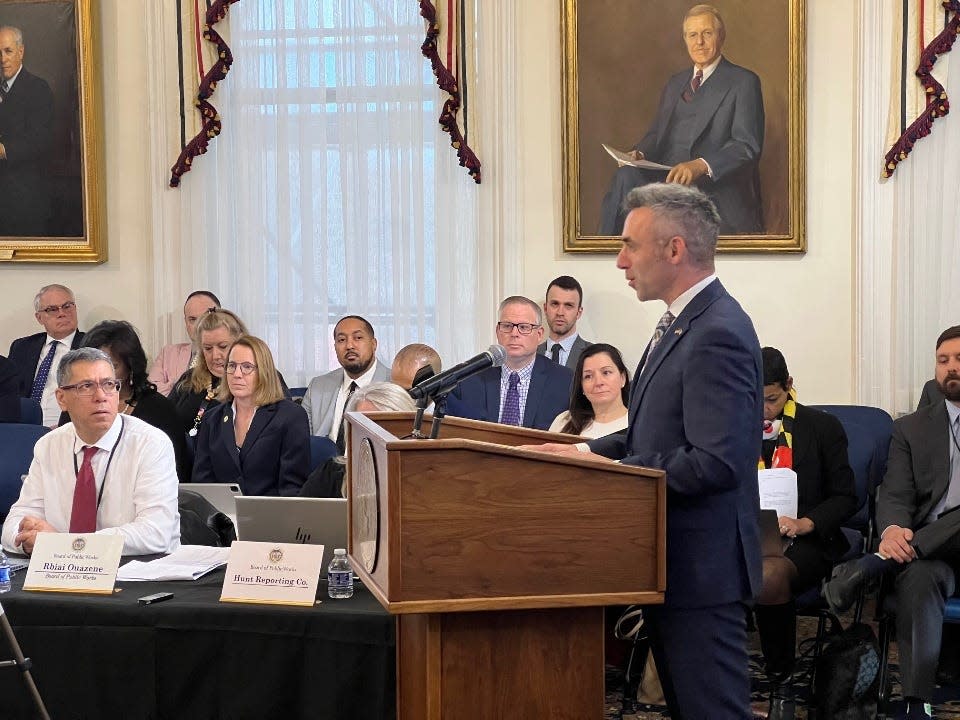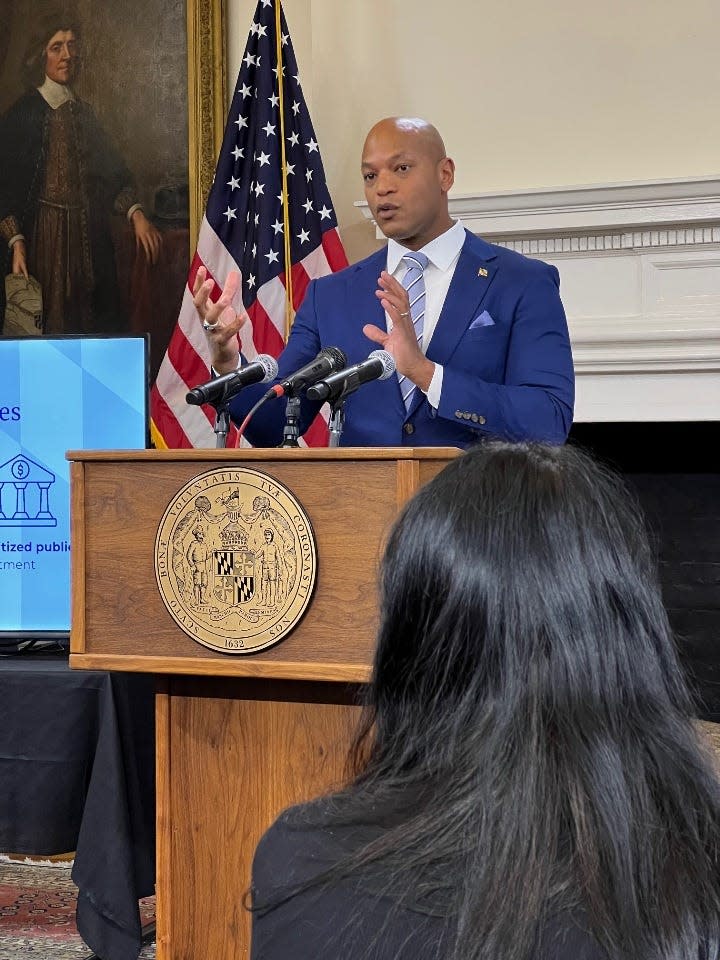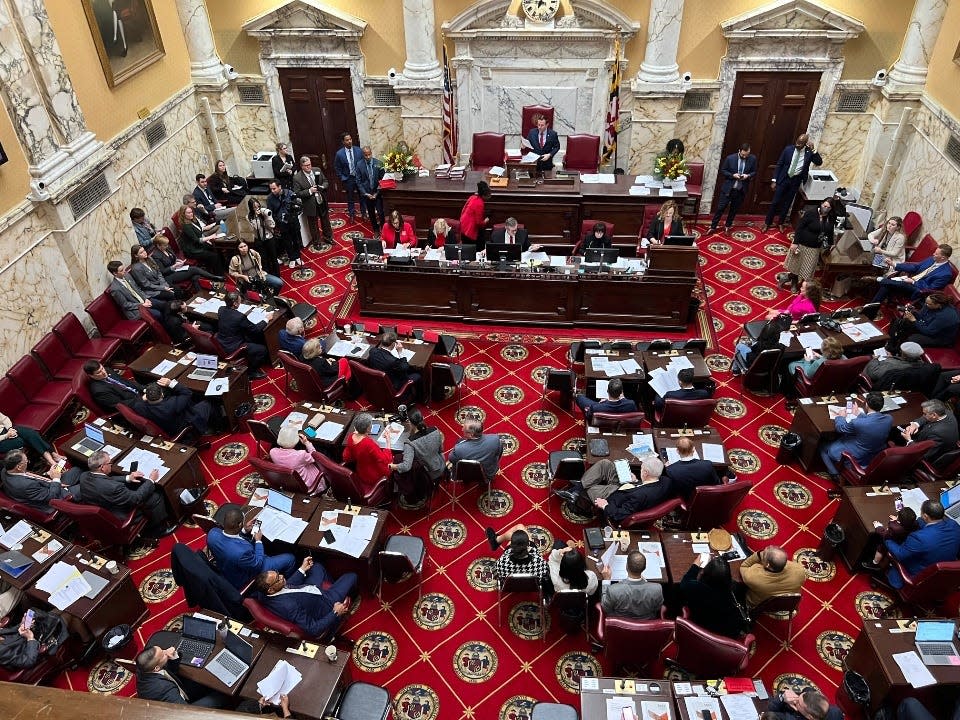Maryland Gov. Moore touts housing package as economic boost as it nears introduction
- Oops!Something went wrong.Please try again later.
The several bills Maryland Governor Wes Moore is backing as part of a “housing package” have not come to the floor of either chamber, nor has their text been revealed as pre-filed legislation. Nevertheless, both the governor and the state’s secretary of housing and community development are pitching the package as starting fuel for an economy trying to grow.
“You cannot continue to have economic growth if we continue to have a housing crisis,” said Moore, at a Jan. 10 news conference, hours before the start of the General Assembly’s scheduled 90-day legislative session in Annapolis. “We have a housing crisis inside this state.”

Maryland Secretary of Housing and Community Development Jake Day indicated last month there is a shortage of at least 96,000 units in the state. In February of last year, Maryland Realtors, a trade association, said the shortage number was 120,000 units, and according to the organization’s president, that number was up from 82,000 the previous year.
Wicomico County mirrors trends seen throughout Maryland
Michael Weisner, president of Weisner Real Estate based in Salisbury, described a real estate market in the Eastern Shore’s Wicomico County, which is experiencing similar trends as the rest of the state: fewer listings, less demand due to higher mortgage rates and higher prices.
“The problem in Wicomico County, and most likely throughout the state, is not the lack of housing in general, but the lack of housing that is affordable,” said Weisner, whose grandfather started the company in 1938, in an email. “The main reason for fewer sales and reduced affordability is mortgage interest rates.”
He pointed to the doubling of interest rates in the last few years. The current 30-year rate of about 7.5% is far above the average rate of 3% from a couple years ago, said Weisner, making monthly payments go from $843 at 3% on a $200,000 home to around $1,400 at the current rate.
More: Maryland home sales plummet: How rising interest rates, high costs are squeezing market
Gov. Moore pitches housing affordability as 'Economics 101'

Moore acknowledged that rate increase during a press conference unveiling his annual budget proposal on Jan. 17. “Mortgage rates have more than doubled over the past two years,” he said.
The governor, speaking one week into the legislative session, put the issue of housing affordability in terms he called “Economics 101.”
“This is a simple equation of supply and demand,” Moore said. “If we do not have enough homes, the prices go up. If we build more homes, the prices come down.”
More: Maryland has slight bump in minority business participation, short of 'aspirational goal'
Economic benefit pitched as a purpose of housing package
During the pre-session press conference, the governor indicated introducing the legislation is something not seen in the state in some time.
“This is the first administration in generations to be able to introduce a housing package into a legislative session and part of the reason is because it’s hard, it’s challenging,” said Moore, speaking from the State House’s Governor’s Reception Room, “but I think this administration has shown that we do hard things because we do them in partnership with the Legislature.”

Many of the details of the package were laid out in reporting by Maryland’s USA TODAY Network last month. The governor provided a broad overview of the package, previewing it, while also advertising its economic benefits during the pre-session press conference last week.
More: Maryland Housing Secretary Day estimates 96,000-unit housing shortage. Bills aim to help.
“We have to be able to put greater supports and protections around renters,” he said. “We have to increase inventory because we have an affordable housing inventory problem in the state of Maryland that needs to be addressed.”
He continued: “We need to make proper investments that we can pull down and leverage more federal dollars and federal supports that are going towards housing. This and a collection of other items become crucial if we want to get our economy going because an economy will not grow if you have housing as one of the main impediments.”
The federal supports were not specified by the governor during the pre-session press conference.
Housing Secretary Jake Day: 'Bills will spur new housing construction'
The state’s housing secretary Jake Day, a former mayor of Salisbury, hammered home the potential economic effect of the legislation in a statement sent by a spokesperson on Tuesday.
“Together these bills will spur new housing construction, enhance long-term financial investment in low-income areas, centralize resources and address pressing issues for Maryland renters, and get our economy moving again,” said Day, in the emailed statement. “The process to develop these proposals has been collaborative as addressing this housing crisis head on requires working with local officials, advocates, the private sector, and legislators. We look forward to continuing to work on a solution that works for Marylanders.”
Dwight A. Weingarten is an investigative reporter, covering the Maryland State House and state issues. He can be reached at dweingarten@gannett.com or on Twitter at @DwightWeingart2.
This article originally appeared on Salisbury Daily Times: Gov. Moore, Sec. Day tout housing package as economic boost for state

